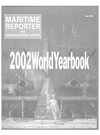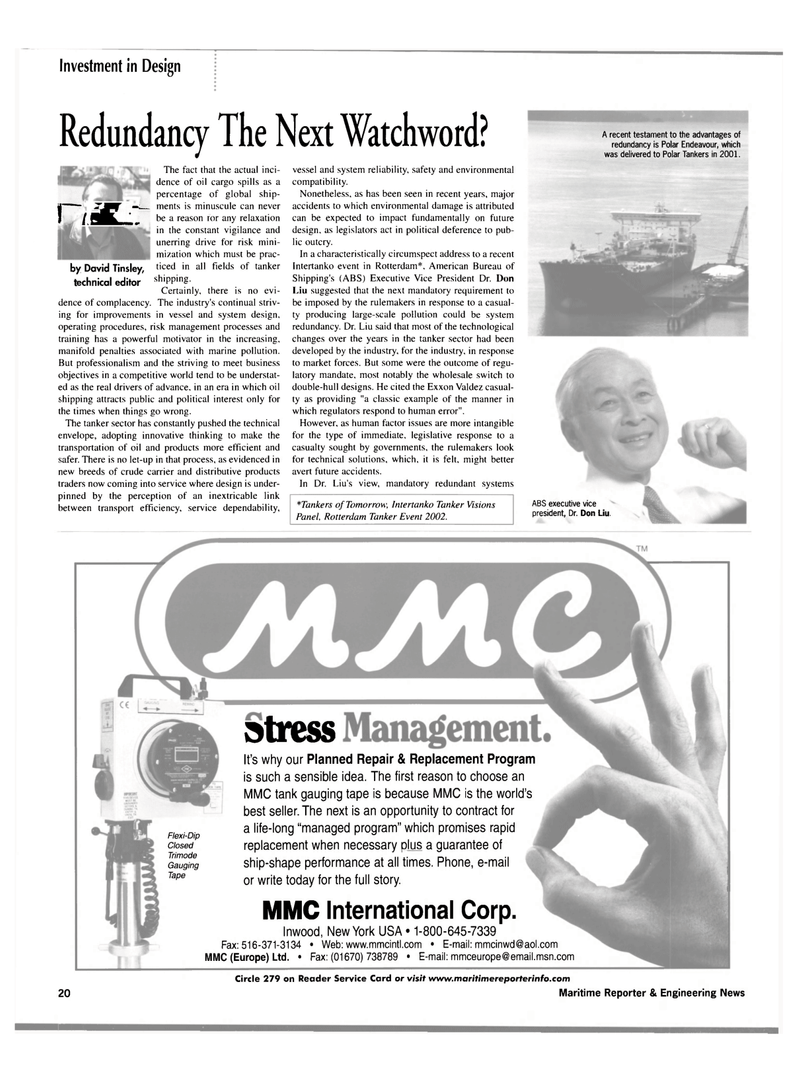
Page 20: of Maritime Reporter Magazine (June 2002)
Read this page in Pdf, Flash or Html5 edition of June 2002 Maritime Reporter Magazine
Investment in Design
Redundancy The Next Watchword? by David Tinsley, technical editor
The fact that the actual inci- dence of oil cargo spills as a percentage of global ship-J -——Z^Kf — ments is minuscule can never / a reason any relaxation in the constant vigilance and unerring drive for risk mini- mization which must be prac- ticed in all fields of tanker shipping.
Certainly, there is no evi- dence of complacency. The industry's continual striv- ing for improvements in vessel and system design, operating procedures, risk management processes and training has a powerful motivator in the increasing, manifold penalties associated with marine pollution.
But professionalism and the striving to meet business objectives in a competitive world tend to be understat- ed as the real drivers of advance, in an era in which oil shipping attracts public and political interest only for the times when things go wrong.
The tanker sector has constantly pushed the technical envelope, adopting innovative thinking to make the transportation of oil and products more efficient and safer. There is no let-up in that process, as evidenced in new breeds of crude carrier and distributive products traders now coming into service where design is under- pinned by the perception of an inextricable link between transport efficiency, service dependability, vessel and system reliability, safety and environmental compatibility.
Nonetheless, as has been seen in recent years, major accidents to which environmental damage is attributed can be expected to impact fundamentally on future design, as legislators act in political deference to pub- lic outcry.
In a characteristically circumspect address to a recent
Intertanko event in Rotterdam*. American Bureau of
Shipping's (ABS) Executive Vice President Dr. Don
Liu suggested that the next mandatory requirement to be imposed by the rulemakers in response to a casual- ty producing large-scale pollution could be system redundancy. Dr. Liu said that most of the technological changes over the years in the tanker sector had been developed by the industry, for the industry, in response to market forces. But some were the outcome of regu- latory mandate, most notably the wholesale switch to double-hull designs. He cited the Exxon Valdez casual- ty as providing "a classic example of the manner in which regulators respond to human error".
However, as human factor issues are more intangible for the type of immediate, legislative response to a casualty sought by governments, the rulemakers look for technical solutions, which, it is felt, might better avert future accidents.
In Dr. Liu's view, mandatory redundant systems
A recent testament to the advantages of redundancy is Polar Endeavour, which was delivered to Polar Tankers in 2001. *Tankers of Tomorrow, Intertanko Tanker Visions
Panel, Rotterdam Tanker Event 2002.
ABS executive vice president, Dr. Don Liu. stress
It's why our Planned Repair & Replacement Program is such a sensible idea. The first reason to choose an
MMC tank gauging tape is because MMC is the world's best seller. The next is an opportunity to contract for a life-long "managed program" which promises rapid replacement when necessary plus a guarantee of ship-shape performance at all times. Phone, e-mail or write today for the full story.
MMC International Corp.
Inwood, New York USA • 1-800-645-7339
Fax:516-371-3134 • Web: www.mmcintl.com • E-mail: [email protected]
MMC (Europe) Ltd. • Fax:(01670)738789 • E-mail: [email protected]
Flexi-Dip
Closed
Trimode
Gauging
Tape
Circle 279 on Reader Service Card or visit www.maritimereporterinfo.com 20 Maritime Reporter & Engineering News

 19
19

 21
21
